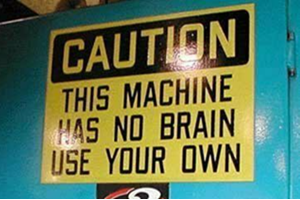Question
I sought out a couple of companies that I want to work with, researched them, found actual names to contact personally, and got interviews. They are impressed with my background and they want the talent I offer in their organization, but do not have a position open right at the moment. What can I say, or how can I continue to approach them so they do not forget about me?
Nick’s Reply
 I’m going to show you how to stop trying to get a job today, and how to invest in job futures.
I’m going to show you how to stop trying to get a job today, and how to invest in job futures.
You have accomplished what all job hunters set out to do: You got a company interested in you. Even though neither of these two can hire you now, they are very real, long-term prospects and you’d be remiss if you did not cultivate them properly.
But here’s the important lesson: This is how most good opportunities germinate.
Job futures
It’s far more likely for an employer to meet impressive candidates than it is to hire one. Even after the interview, you remain impressive. It’s just that, no matter how impressed it was, the employer forgets you. It’s on you to keep that spark of interest alive by investing in it. Most people just flat-out fail to recognize and nurture “job futures.” Future opportunities are some of the very best if you keep tending them. Don’t let this one die on the vine.
Good opportunities germinate in a first encounter, and bear fruit later.
Imagine if during your life you had five or ten companies express this level of interest in you. At some point in the future, one or more of these seeds could blossom into a serious opportunity, but only if you tend it during all that time. The next step you take is potentially far more important than responding to job postings or tweaking your LinkedIn profile. So get moving.
They won’t forget you
I would e-mail or call the managers you spoke with. Give a gracious thank-you, and ask if there are other positions open — positions for which you might be able to recommend other candidates. Yes, you are offering a professional courtesy. You are helping these managers fill other jobs and you’re establishing a valuable relationship, and you’re helping a friend get a job. (Don’t worry that you’re creating your own competition by referring someone else! If these managers think you’d fit one of those other jobs, they now have even more reason to consider you — they already know you!)
They won’t forget you.
Then ask for a favor in return: Do they know managers in other good companies — managers they respect — to whom they would recommend you? Add, “And if nothing works out, I promise to stay in touch with you in the event a position opens up in your company.” Ping them every three months. Share a relevant article you’ve read, ask for advice about some work-related topic, and otherwise gently cultivate your connection.
Keep tending this investment and they won’t forget you. This is how I cultivate good candidates I’ve found but have not placed. Yet.
Invest now
I’ve seen people miss out on great opportunities because they failed to understand how long-term business relationships work, and because they are in a rush. They want a job now, so they disregard a chance to develop a lasting relationship they will need in the future. Today’s job often arises from diligent follow-up work you started years ago.
In three years, you’ll wish you’d started doing this now.
Has a rejection ever turned into a job offer for you later on? Do you stay in touch with managers you “clicked” with but who didn’t hire you? Do you have other examples of such contrarian experiences, where a thoughtful courtesy — I call it investing in job futures — results in a benefit later on?
: :




 Ever ask a hiring manager for their resume before you agree to a job interview? No? Why not?
Ever ask a hiring manager for their resume before you agree to a job interview? No? Why not?
 Wharton management professor Peter Cappelli ran into a former student who noticed an increasing number of managers being hired on contract. These weren’t consultants or people angling for full-time work, but contractors who were being handed over control of company employees to execute a project or tackle a problem.
Wharton management professor Peter Cappelli ran into a former student who noticed an increasing number of managers being hired on contract. These weren’t consultants or people angling for full-time work, but contractors who were being handed over control of company employees to execute a project or tackle a problem.
 “The best way to land a new job is to make new contacts. Hang out with people who do the work you want to do.” Nick, you often write that and it makes me misty for the days when that was possible. [
“The best way to land a new job is to make new contacts. Hang out with people who do the work you want to do.” Nick, you often write that and it makes me misty for the days when that was possible. [
 First, you shouldn’t worry about what any headhunter is interested in. Headhunters are involved in relatively few hires among all jobs that get filled every day. You should be focused instead on conducting your own job search and cultivating good professional contacts. Most hires come from respected sources in your field that know and recommend you.
First, you shouldn’t worry about what any headhunter is interested in. Headhunters are involved in relatively few hires among all jobs that get filled every day. You should be focused instead on conducting your own job search and cultivating good professional contacts. Most hires come from respected sources in your field that know and recommend you.
 All went well. They said they wanted to grow the division to 3X its size under his leadership, and that they would make it worth his while. We were shocked when the offer came through without mention of any incentive plan to meet the ambitious growth objectives that were a cornerstone of their discussions. The offer was just a solid salary and a promise of a “review in 6 months.”
All went well. They said they wanted to grow the division to 3X its size under his leadership, and that they would make it worth his while. We were shocked when the offer came through without mention of any incentive plan to meet the ambitious growth objectives that were a cornerstone of their discussions. The offer was just a solid salary and a promise of a “review in 6 months.”